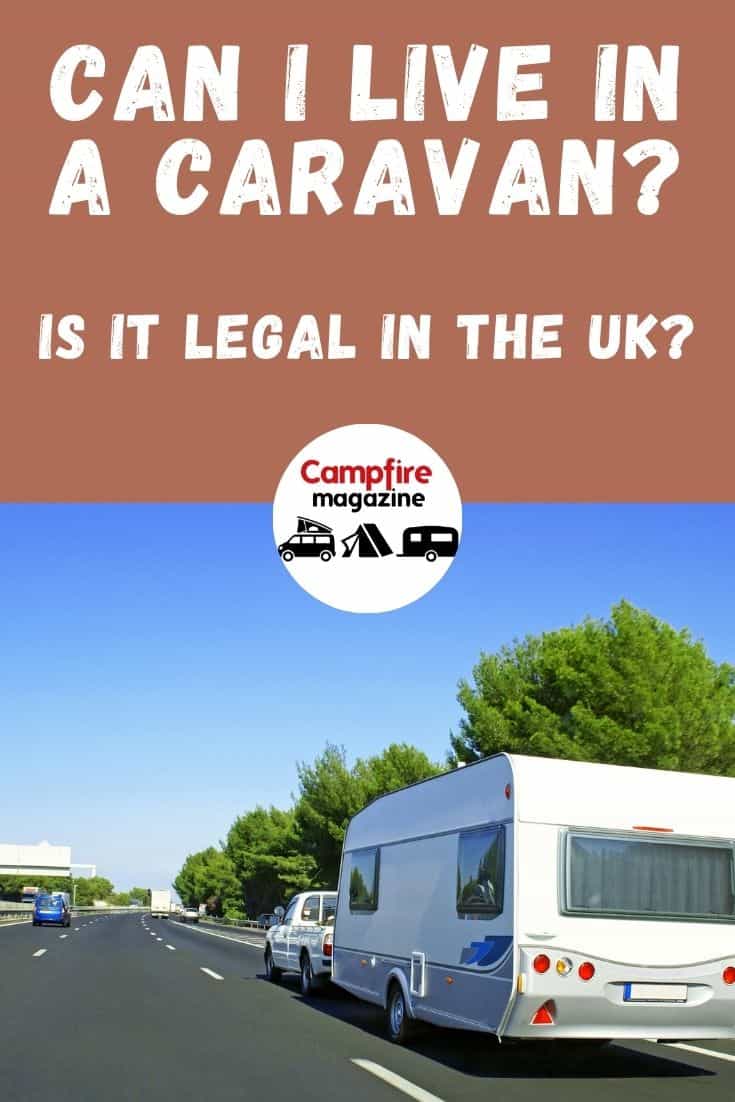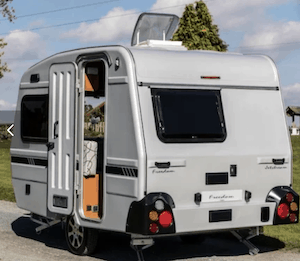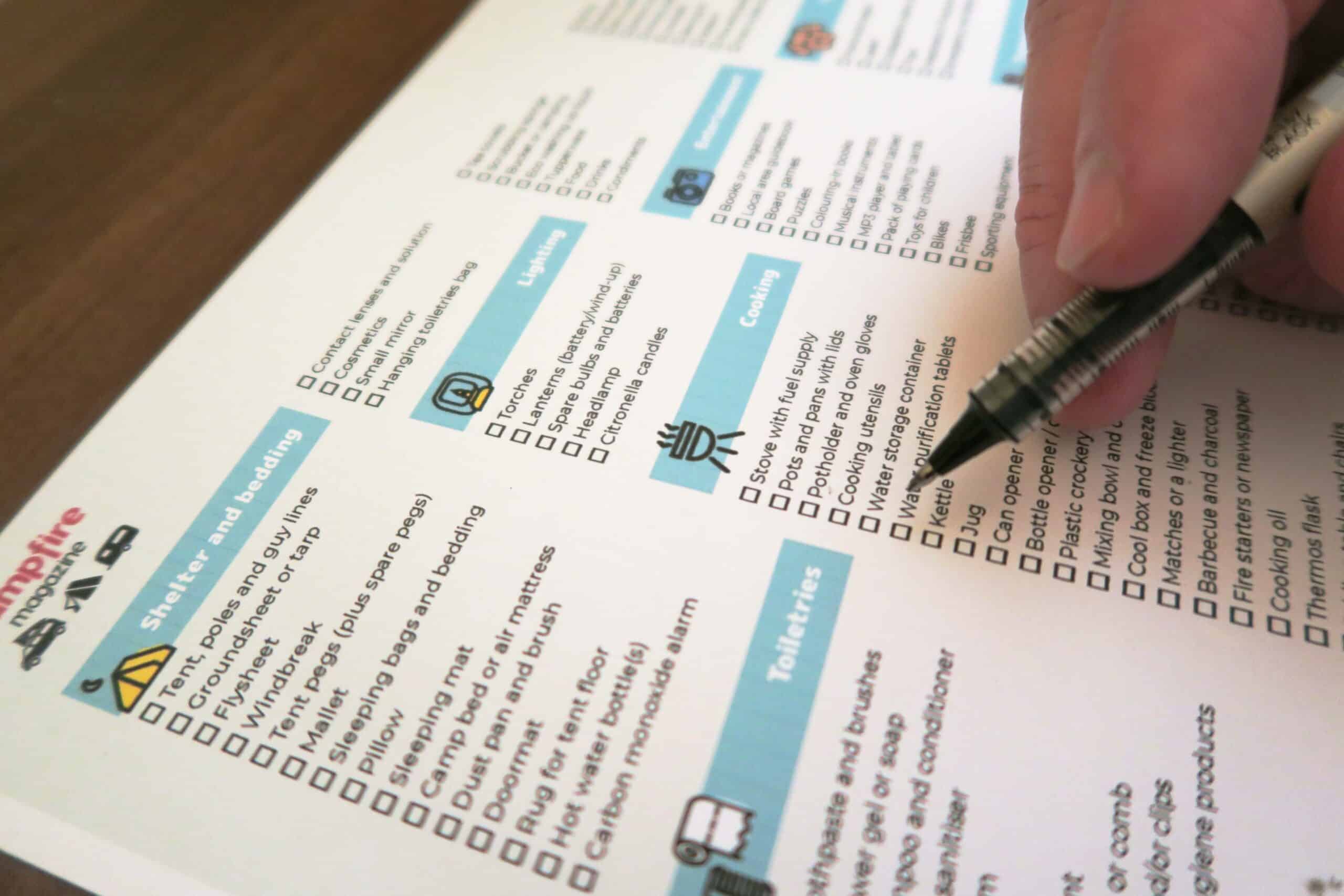Having the comfort of four walls around you is great, but for some people, the idea of being tied to one location and living in a traditional house is a little too mundane. Not to mention the fact that by staying in alternative accommodation, one could stand to save a considerable amount of money.
However, what a lot of caravan owners are concerned about is whether it is legal to live in their vehicle full time. It isn’t uncommon to see travelling communities being moved on by police and as a result of this, most people believe it is illegal to live in a caravan.
In reality, it is not illegal to permanently inhabit a caravan. That being said, there are certain rules that you must abide by if you want to stay on the right side of the law. Furthermore, there may be issues with certain things like banking and employment since you must have a permanent address for these purposes.

In this guide, we will be exploring what you’ll need to do if you want to legally live in your caravan full time as well as looking at how this way of life might benefit you or serve as a disadvantage.

Is It Legal To Live In A Caravan in the UK?
If you were hoping to be able to pile all your worldly belongings into your caravan and park up anywhere you pleased, then you will be disappointed. There are laws that prohibit caravan users from parking on the side of the road. It won’t take long before you are discovered and the local council will be asking you to move on. If you do not comply, then they are within their rights to take legal action.
That being said, there are some places that a caravan can be legally parked that are not on your own driveway. For example, let’s assume your neighbour has a spare plot of land and they give you permission to park your caravan on it, this would be perfectly legal. However, if the land is on the roadside, there are a few things that you must make sure of.
If the caravan is on a residential road it must be parked so that the rear lights can be seen by oncoming traffic. Furthermore, during the hours of darkness, the vehicle must be illuminated if they exceed the legal size limit. This will make them visible to traffic.
If a caravan is parked on the side of the road and there is not a car attached to it, then there are further precautions that need to be taken. For example, at least one of the caravan’s wheels must be secured to prevent it from turning. Most commonly, this will be done using a wheel clamp but you may also use a chain.
OK, so if you can’t park up on public land then perhaps heading to the local caravan site and pitching permanently there might be the next best option. Unfortunately, you’ll likely meet another roadblock here. This isn’t because you cannot stay on these sites for a longer period of time, but because you can’t extend a lengthy holiday to a permanent residence.
The problem is that caravan sites are designed to be used over the short term. As a result of this, they are only licensed to allow caravans to remain on site for up to 28 days. There may be some that are only permitted to allow you there for 21 days but this varies by park so you will need to check this. Once your time has expired, you will need to remove your caravan from the site although after 48 hours, you are free to return.
That being said, there are some caravan site owners who might disregard the law and allow you to stay but we cannot say what might happen as a result of this.
Finally, if you decide to move from caravan site to caravan site then you would, in theory be able to live in your caravan full time. However, since you must have a permanent address for many reasons such as using a doctor, bank or for voting, you would need to make sure that you retained ownership of your house or other permanent accommodation. What’s more, if you do move around different sites, you must make sure that your caravan is road legal and that the vehicle towing it has a full MOT.
Can I Live In A Caravan On My Private Property?
If you park your caravan on your own land then there is nothing stopping you from remaining in there as long as you would like. However, one of the reasons that a lot of people consider moving into a caravan full time is to save money. But the law stipulates that you must use the caravan as an add-on or annex which means that you would still need a main home on the land.
Regardless of whether or not you use the main house as your main home, you would still need to pay council tax, water rates and other bills associated with homeownership so likely wouldn’t save a lot of cash. That being said, if you want to live in your caravan simply because you enjoy it, this would be the best way to do it without having to move from park to park.
But, much like parking on public roads, there may be limitations as to what you can do when parking on your own drive or land. While it is not common, there are some house deeds that come with restrictive clauses that prevent parking large vehicles like caravans on the property. For this reason, we would suggest checking your deeds before making a decision and if you are purchasing a house, this is something that you should look at before signing.
Pros And Cons Of Living In A Caravan
The appeal of living a nomadic lifestyle and not having to worry about the stresses and strains of modern life is certainly a draw for many people. There are a lot of benefits to living in a caravan full time but there may also be many drawbacks that could have you clamouring for home. If you are going to try and make it work, it is important to understand the pros and cons of living in a caravan.
Pro - It’s Cheaper Than Living In A House
If you are able to secure a spot on a permanent caravan site then you would benefit from not having to pay as much as living in a house. The average rent in the UK at the time of writing sits at around £860 per month and the cost of buying a house can range from less than £100,000 into the millions.
Now, we have to stress that you do need to have a permanent address for many things so having a home is important. However, even if you maintain ownership of your property, for example if you have paid off the mortgage, you will likely spend less in caravan park fees than you would running the house.
Pro - You Have Freedom
Wouldn’t it be great if you could pick up your home and place it wherever you felt like? Of course, this isn’t possible with a traditional house but when you are living in a caravan, you can pick up and move on whenever the urge takes you. If you’re keen to explore some of the beautiful sites that the UK has to offer then touring in a caravan is a great way to experience this.
There are, according to Forbes more than 4000 camping and caravan parks around the UK, so you certainly aren’t limited on choice. Even if you pitched for the full 28 days in every park, it would take you an immense amount of time to cover all of them.
Pro - It’s More Relaxing
There is no denying that modern life can be incredibly stressful. Many people work long hours and have very little time for recreation but living in a caravan might change all of that. There are far fewer things to maintain. For example, the amount of time you might spend cleaning and caring for a four-bedroom house would be markedly more than you would spend caring for a small caravan. This means that you would have more time to do the things you enjoy.
Living in a caravan may be a huge attraction for people who have retired and want to make the most of this precious time. There is no need to tend to a garden and for the most part, life will feel much more like a holiday.
Con - Claiming Government Benefits Can Be Tricky
For many of the government benefits, you must be able to prove that you mainly reside in a specific area and provide proof of your address. However, when living in a caravan, this is not always possible. That being said, if you set up on a permanent caravan site, then this problem may not be as trying.
Con - Your Car Insurance May Suffer
Again, when you take out insurance on your car, you must be able to provide a permanent address. If you are living in a caravan, this will not be possible and this could void your insurance.
Con - Further Issues With Address
Most of the problems relating to living in a caravan span from not having a permanent address. While benefits and car insurance are some of the most problematic, you may find that you also have difficulty obtaining a bank account or being able to register with a GP surgery.
Con - It Is Less Comfortable
Caravans are typically designed to be lived in temporarily and so they will not have many of the creature comforts that a house would be able to offer. While some of the more modern caravans certainly have many mod-cons and can be incredibly comfortable, they still don’t match the comfort of living in a house.
You may find that, during much colder weather, it is more difficult to stay warm in a caravan. While there are ways to heat it, the lack of heavy insulation that you would benefit from when living in a house means that they are more difficult to heat. For older people or those with health conditions, this could put you in a vulnerable position.
Conclusion
The idea of packing everything up and living a more simple way of life in a caravan certainly has its appeal. While there may be downsides, there are many reasons that people find this way of life attractive. However, it can be very tricky where the law is concerned. Not only do you need to have a permanent address in order to be able to use things like banks, doctors and government benefits, but there are laws that prevent you from permanently living in a caravan.
For example, caravan parks are limited as to how long they can allow you to remain. Typically, this is 28 days at a time, although you may return after 48 hours away. What’s more, even parking on your own property comes with some legalities and in extreme cases, your house deeds may not allow you to park a large vehicle on your drive.
If you are in any doubt as to local laws or what you are and aren’t allowed to do then the best thing is to contact your local council for advice.

